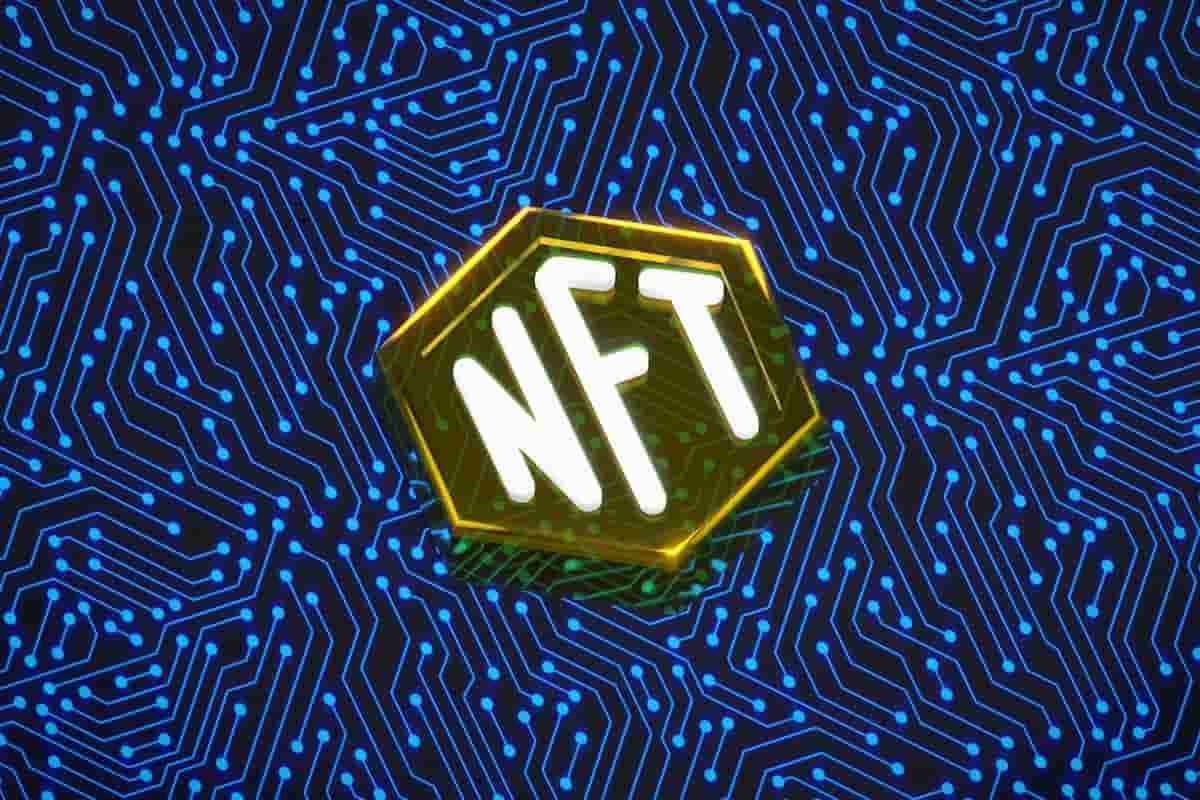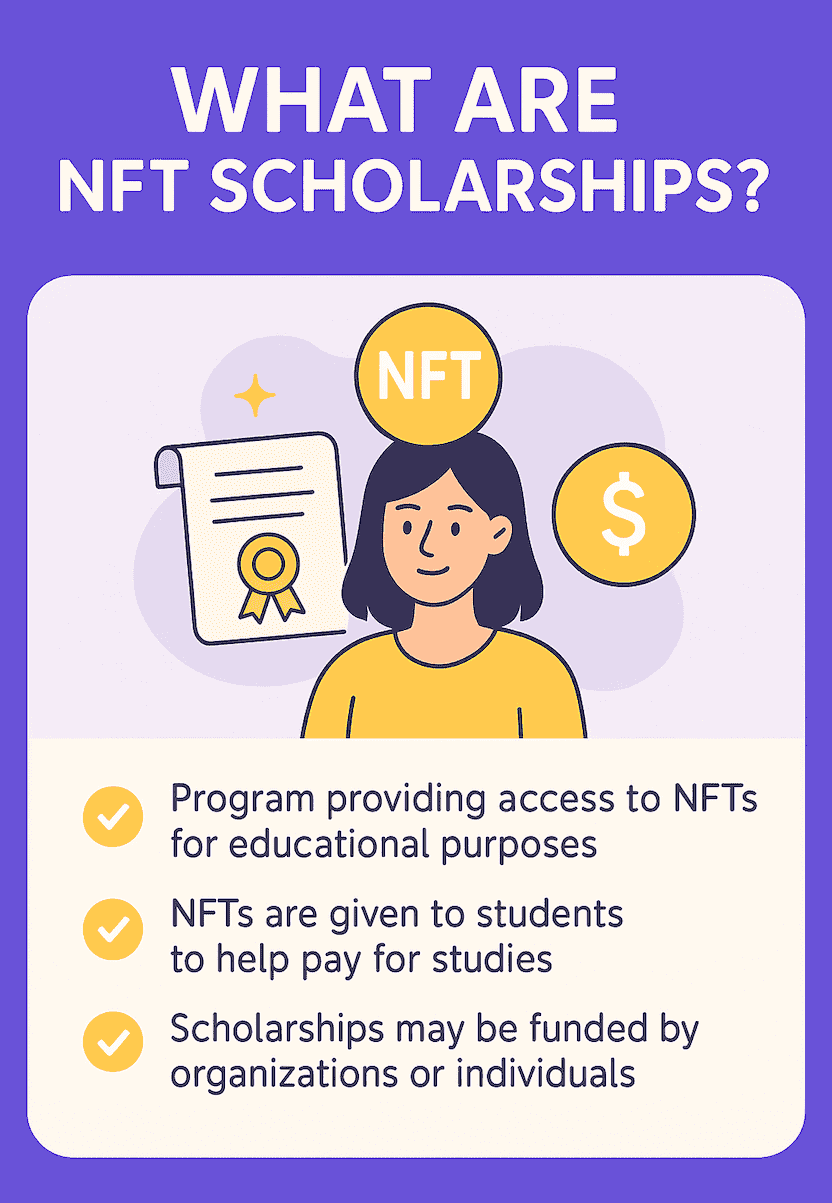Advertiser Disclosure
Last update: September 25, 2025
5 minutes read
What Are NFT Scholarships? (A New Way Students Are Funding College?... Don't Fall for the Hype)
NFT scholarships sound trendy but rarely exist. Learn why most are hype, the risks involved, and why traditional scholarships are still your best bet.

By Derick Rodriguez, Associate Editor
Edited by Yerain Abreu, M.S.
Learn more about our editorial standards



By Derick Rodriguez, Associate Editor
Edited by Yerain Abreu, M.S.
Learn more about our editorial standards
Tired of competing for the same old scholarships? Some people are pushing "NFT scholarships" as this amazing new alternative. But they're not really a thing yet, and what does exist isn't worth your time.
These aren't the funding revolution they're marketed as. They're mostly just regular scholarships with extra steps and a lot more risk.

Key takeaways
- NFT scholarships are mostly hype; few real programs exist, and most just use NFT sales to fund normal scholarships
- Risks include scams, crypto crashes, and extra complexity without real benefits
- Stick to traditional scholarships for reliable funding; NFT versions aren’t worth your time
What is an NFT scholarship?
An NFT is basically a digital receipt that says you own something online. Can't be copied, lives on a blockchain, yadda yadda.
Here's where it gets weird: "NFT scholarships" are almost never actually scholarships distributed as NFTs. Instead, you've got two main flavors of disappointment:
- Fake NFT scholarships: Companies sell digital art, use the money for regular scholarship programs, slap "NFT" in the marketing
- Imaginary NFT scholarships: Theoretical concepts that sound cool in whitepapers but don't actually exist
The whole thing is like calling your lemonade stand a "blockchain beverage distribution network." Same lemonade, fancier name.
Real talk: I spent way too much time looking for actual examples of students getting scholarship NFTs. Found basically nothing that wasn't just normal funding with extra marketing fluff.

The Nextgrad reality check
NextGrad keeps getting mentioned as this big NFT scholarship success story. So I dug in.
Turns out they're selling a single NFT for, get this, $1,000,000. But it's not a scholarship at all. It's advertising access to their high school network for five years. You know, for when you have a million bucks lying around and really need to reach teenagers.
They do give out scholarships (about $650k total since they started), but those are completely separate from their NFT stuff. Just regular scholarships funded through their business operations.
This is basically the poster child for NFT scholarship marketing: take something normal, add blockchain terminology, and hope nobody looks too closely.

TuitionHero Tip
Universities, foundations, and trusted scholarship sites are far safer than flashy blockchain startups.
Compare private student loans now
TuitionHero simplifies your student loan decision, with multiple top loans side-by-side.
Compare Rates
Are these things even legit?
Short answer: Proceed with extreme caution.
Long answer: The technology works fine, but actual legitimate programs are rarer than unicorns. Most stuff you'll find falls into these categories:
Probably scams:
- Want money upfront
- Promise automatic payments through "smart contracts" (spoiler: they don't work)
- Can't explain how their system actually functions
- No track record of helping real students
Misleading but not illegal:
- Sell NFTs, fund regular scholarships, market it as revolutionary
- Use blockchain buzzwords for normal processes
- Technically deliver on promises but in the most boring way possible
Actually legitimate (rare):
- Clear about what they're doing (usually just fundraising)
- Don't promise magical blockchain benefits
- Have verifiable history of helping students
- Admit they're basically running normal scholarship programs
Crypto volatility warning: Even legitimate programs tied to cryptocurrency can see their funding evaporate overnight. That $10K scholarship fund could be worth $3K by the time you need it.

TuitionHero Tip
No legitimate scholarship asks for money to apply; if an NFT program requires you to buy an NFT first, that’s a red flag.
Who’s actually doing this? (Spoiler: Almost nobody)
After way too much research, here's what actually exists:
- NextGrad: Million-dollar advertising NFT + separate traditional scholarships. Not really "NFT scholarships"
- Random crypto companies: Sometimes sponsor students studying blockchain stuff. Normal scholarships, just from crypto-focused organizations
- Individual artists: Occasionally sell NFTs to help specific students. Sweet gesture, but not a reliable funding strategy
- Academic researchers: Write papers about potential applications. Zero actual programs
Missing entirely:
- Universities using blockchain for financial aid
- Large-scale NFT scholarship systems
- Any of the "automatic smart contract payments" promised in marketing materials
The whole "emerging field" is mostly emerging in Medium articles, not real life.

TuitionHero Tip
Only trust organizations that have verifiable proof of awarding real scholarships to real students. If you can’t find past recipients, it’s hype.
Should you bother? (Probably not)
Unless you enjoy chasing theoretical opportunities that might never exist, skip it.
Maybe consider if:
- You're studying blockchain/crypto specifically
- Traditional scholarships haven't worked out
- You have tons of free time for research
- You're comfortable with high-risk experimental stuff
Definitely skip if:
- You need reliable funding you can count on
- The word "cryptocurrency" makes you nervous
- You prefer dealing with established organizations
- You want to maximize your time-to-scholarship ratio
Better strategy: Focus entirely on traditional scholarships. They're boring, they work, and they won't disappear if Bitcoin crashes next week.
The realistic pros and cons of NFT scholarships
Theoretical Benefits | Actual Problems |
|---|---|
Could work globally someday | Virtually no programs exist |
Might be more transparent | Current programs aren't more transparent |
Could reduce paperwork | Same application processes |
Sounds innovative | Innovation mostly in marketing |
Permanent records | Regular records work fine |
High scam risk | |
Market crashes affect funding | |
Technical complexity for no benefit | |
Legal uncertainty |

Why trust TuitionHero
At TuitionHero, we help you find the best private student loans by comparing top lenders and breaking down eligibility, interest rates, and repayment options. Whether you need additional funding beyond federal aid or a loan without a cosigner, we simplify the process. We also provide expert insights on refinancing, FAFSA assistance, scholarships, and student credit cards to support your financial success.
Frequently asked questions (FAQ)
Technically? Yes, Practically? No. The few real programs just use NFT sales to fund normal scholarships. You're not getting magical blockchain money.
No. If someone asks for crypto payments or wallet connections, run away.
Scholarship money is scholarship money, regardless of how it was raised. Standard tax rules apply.
Stick with established organizations. If it sounds too good to be true and involves blockchain, it probably is.
Maybe? But waiting for a maybe isn't a college funding strategy.
Final thoughts
NFT scholarships are a solution looking for a problem. Traditional scholarship systems work fine for distributing billions of dollars annually to students.
The "blockchain revolution" in education funding exists mostly in press releases and startup pitch decks. Real students need real money for real tuition bills, and that's still coming from traditional sources.
My advice? Apply for established scholarships from universities, foundations, and legitimate organizations. If the NFT scholarship revolution ever happens (big if), you'll hear about it. But don't hold your breath, or your tuition payments.
Focus on what works. Everything else is just noise with fancy branding.
Source
Author

Derick Rodriguez
Derick Rodriguez is a seasoned editor and digital marketing strategist specializing in demystifying college finance. With over half a decade of experience in the digital realm, Derick has honed a unique skill set that bridges the gap between complex financial concepts and accessible, user-friendly communication. His approach is deeply rooted in leveraging personal experiences and insights to illuminate the nuances of college finance, making it more approachable for students and families.
Editor

Yerain Abreu
Yerain Abreu is a Content Strategist with over 7 years of experience. He earned a Master's degree in digital marketing from Zicklin School of Business. He focuses on college finance, a niche carved out of his journey through the complexities of academic finance. These firsthand experiences provide him with a unique perspective, enabling him to create content that's informative and relatable to students and their families grappling with the intricacies of college financing.
At TuitionHero, we're not just passionate about our work - we take immense pride in it. Our dedicated team of writers diligently follows strict editorial standards, ensuring that every piece of content we publish is accurate, current, and highly valuable. We don't just strive for quality; we aim for excellence.
Related posts
While you're at it, here are some other college finance-related blog posts you might be interested in.
Shop and compare student financing options - 100% free!

Always free, always fast
TuitionHero is 100% free to use. Here, you can instantly view and compare multiple top lenders side-by-side.

Won’t affect credit score
Don’t worry – checking your rates with TuitionHero never impacts your credit score!

Safe and secure
We take your information's security seriously. We apply industry best practices to ensure your data is safe.
Finished scrolling? Start saving & find your private student loan rate today
Compare Personalized Rates


